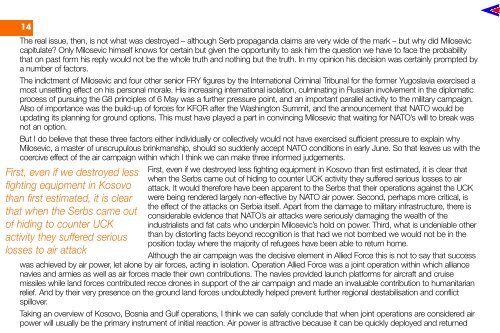THE RAF AIR POWER REVIEW - Royal Air Force Centre for Air ...
THE RAF AIR POWER REVIEW - Royal Air Force Centre for Air ...
THE RAF AIR POWER REVIEW - Royal Air Force Centre for Air ...
You also want an ePaper? Increase the reach of your titles
YUMPU automatically turns print PDFs into web optimized ePapers that Google loves.
14<br />
The real issue, then, is not what was destroyed – although Serb propaganda claims are very wide of the mark – but why did Milosevic<br />
capitulate? Only Milosevic himself knows <strong>for</strong> certain but given the opportunity to ask him the question we have to face the probability<br />
that on past <strong>for</strong>m his reply would not be the whole truth and nothing but the truth. In my opinion his decision was certainly prompted by<br />
a number of factors.<br />
The indictment of Milosevic and four other senior FRY figures by the International Criminal Tribunal <strong>for</strong> the <strong>for</strong>mer Yugoslavia exercised a<br />
most unsettling effect on his personal morale. His increasing international isolation, culminating in Russian involvement in the diplomatic<br />
process of pursuing the G8 principles of 6 May was a further pressure point, and an important parallel activity to the military campaign.<br />
Also of importance was the build-up of <strong>for</strong>ces <strong>for</strong> KFOR after the Washington Summit, and the announcement that NATO would be<br />
updating its planning <strong>for</strong> ground options. This must have played a part in convincing Milosevic that waiting <strong>for</strong> NATO’s will to break was<br />
not an option.<br />
But I do believe that these three factors either individually or collectively would not have exercised sufficient pressure to explain why<br />
Milosevic, a master of unscrupulous brinkmanship, should so suddenly accept NATO conditions in early June. So that leaves us with the<br />
coercive effect of the air campaign within which I think we can make three in<strong>for</strong>med judgements.<br />
First, even if we destroyed less fighting equipment in Kosovo than first estimated, it is clear that<br />
when the Serbs came out of hiding to counter UCK activity they suffered serious losses to air<br />
attack. It would there<strong>for</strong>e have been apparent to the Serbs that their operations against the UCK<br />
were being rendered largely non-effective by NATO air power. Second, perhaps more critical, is<br />
the effect of the attacks on Serbia itself. Apart from the damage to military infrastructure, there is<br />
considerable evidence that NATO’s air attacks were seriously damaging the wealth of the<br />
industrialists and fat cats who underpin Milosevic’s hold on power. Third, what is undeniable other<br />
than by distorting facts beyond recognition is that had we not bombed we would not be in the<br />
position today where the majority of refugees have been able to return home.<br />
Although the air campaign was the decisive element in Allied <strong>Force</strong> this is not to say that success<br />
was achieved by air power, let alone by air <strong>for</strong>ces, acting in isolation. Operation Allied <strong>Force</strong> was a joint operation within which alliance<br />
navies and armies as well as air <strong>for</strong>ces made their own contributions. The navies provided launch plat<strong>for</strong>ms <strong>for</strong> aircraft and cruise<br />
missiles while land <strong>for</strong>ces contributed recce drones in support of the air campaign and made an invaluable contribution to humanitarian<br />
relief. And by their very presence on the ground land <strong>for</strong>ces undoubtedly helped prevent further regional destabilisation and conflict<br />
spillover.<br />
Taking an overview of Kosovo, Bosnia and Gulf operations, I think we can safely conclude that when joint operations are considered air<br />
power will usually be the primary instrument of initial reaction. <strong>Air</strong> power is attractive because it can be quickly deployed and returned<br />
First, even if we destroyed less<br />
fighting equipment in Kosovo<br />
than first estimated, it is clear<br />
that when the Serbs came out<br />
of hiding to counter UCK<br />
activity they suffered serious<br />
losses to air attack

















